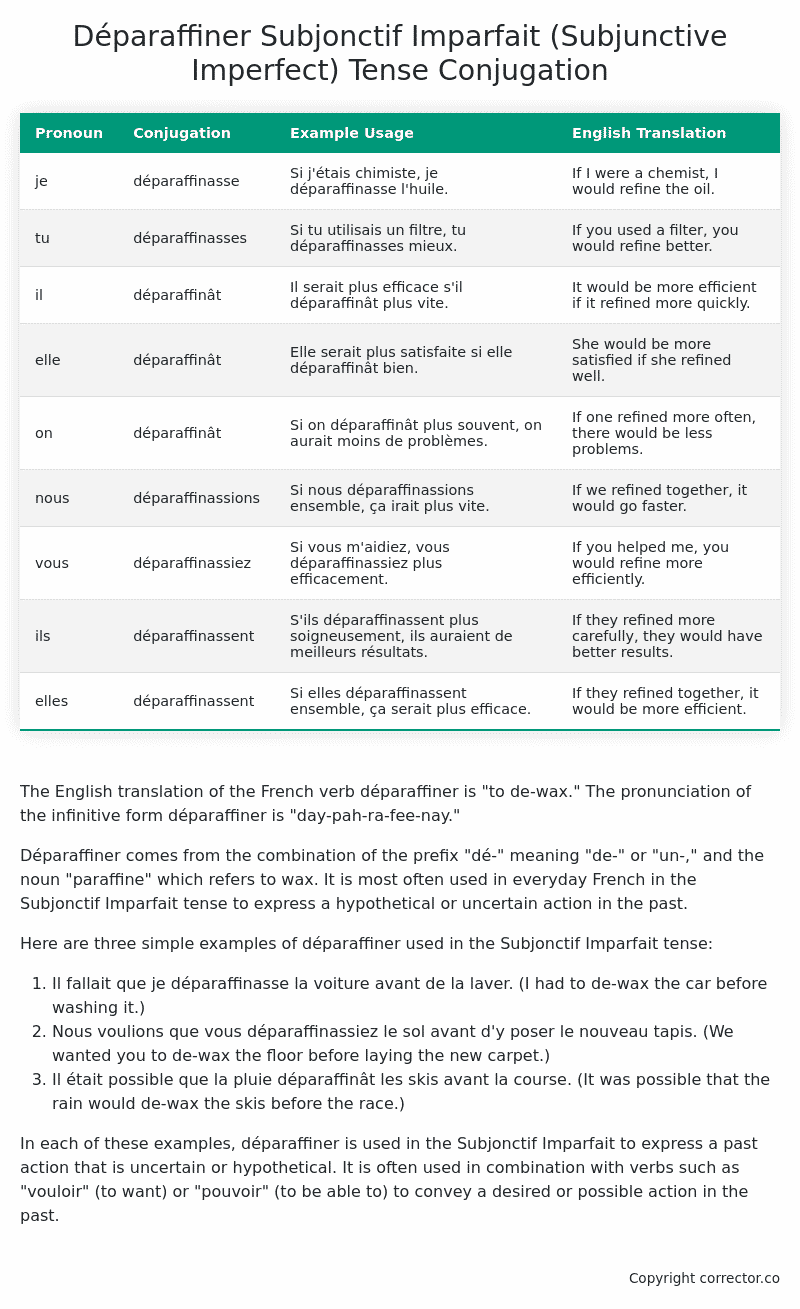Subjonctif Imparfait (Subjunctive Imperfect) Tense Conjugation of the French Verb déparaffiner
Introduction to the verb déparaffiner
The English translation of the French verb déparaffiner is “to de-wax.” The pronunciation of the infinitive form déparaffiner is “day-pah-ra-fee-nay.”
Déparaffiner comes from the combination of the prefix “dé-” meaning “de-” or “un-,” and the noun “paraffine” which refers to wax. It is most often used in everyday French in the Subjonctif Imparfait tense to express a hypothetical or uncertain action in the past.
Here are three simple examples of déparaffiner used in the Subjonctif Imparfait tense:
- Il fallait que je déparaffinasse la voiture avant de la laver. (I had to de-wax the car before washing it.)
- Nous voulions que vous déparaffinassiez le sol avant d’y poser le nouveau tapis. (We wanted you to de-wax the floor before laying the new carpet.)
- Il était possible que la pluie déparaffinât les skis avant la course. (It was possible that the rain would de-wax the skis before the race.)
In each of these examples, déparaffiner is used in the Subjonctif Imparfait to express a past action that is uncertain or hypothetical. It is often used in combination with verbs such as “vouloir” (to want) or “pouvoir” (to be able to) to convey a desired or possible action in the past.
Table of the Subjonctif Imparfait (Subjunctive Imperfect) Tense Conjugation of déparaffiner
| Pronoun | Conjugation | Example Usage | English Translation |
|---|---|---|---|
| je | déparaffinasse | Si j’étais chimiste, je déparaffinasse l’huile. | If I were a chemist, I would refine the oil. |
| tu | déparaffinasses | Si tu utilisais un filtre, tu déparaffinasses mieux. | If you used a filter, you would refine better. |
| il | déparaffinât | Il serait plus efficace s’il déparaffinât plus vite. | It would be more efficient if it refined more quickly. |
| elle | déparaffinât | Elle serait plus satisfaite si elle déparaffinât bien. | She would be more satisfied if she refined well. |
| on | déparaffinât | Si on déparaffinât plus souvent, on aurait moins de problèmes. | If one refined more often, there would be less problems. |
| nous | déparaffinassions | Si nous déparaffinassions ensemble, ça irait plus vite. | If we refined together, it would go faster. |
| vous | déparaffinassiez | Si vous m’aidiez, vous déparaffinassiez plus efficacement. | If you helped me, you would refine more efficiently. |
| ils | déparaffinassent | S’ils déparaffinassent plus soigneusement, ils auraient de meilleurs résultats. | If they refined more carefully, they would have better results. |
| elles | déparaffinassent | Si elles déparaffinassent ensemble, ça serait plus efficace. | If they refined together, it would be more efficient. |
Other Conjugations for Déparaffiner.
Le Present (Present Tense) Conjugation of the French Verb déparaffiner
Imparfait (Imperfect) Tense Conjugation of the French Verb déparaffiner
Passé Simple (Simple Past) Tense Conjugation of the French Verb déparaffiner
Passé Composé (Present Perfect) Tense Conjugation of the French Verb déparaffiner
Futur Simple (Simple Future) Tense Conjugation of the French Verb déparaffiner
Futur Proche (Near Future) Tense Conjugation of the French Verb déparaffiner
Plus-que-parfait (Pluperfect) Tense Conjugation of the French Verb déparaffiner
Passé Antérieur (Past Anterior) Tense Conjugation of the French Verb déparaffiner
Futur Antérieur (Future Anterior) Tense Conjugation of the French Verb déparaffiner
Subjonctif Présent (Subjunctive Present) Tense Conjugation of the French Verb déparaffiner
Subjonctif Passé (Subjunctive Past) Tense Conjugation of the French Verb déparaffiner
Subjonctif Imparfait (Subjunctive Imperfect) Tense Conjugation of the French Verb déparaffiner (this article)
Conditionnel Présent (Conditional Present) Tense Conjugation of the French Verb déparaffiner
Conditionnel Passé (Conditional Past) Tense Conjugation of the French Verb déparaffiner
L’impératif Présent (Imperative Present) Tense Conjugation of the French Verb déparaffiner
L’infinitif Présent (Infinitive Present) Tense Conjugation of the French Verb déparaffiner
Struggling with French verbs or the language in general? Why not use our free French Grammar Checker – no registration required!
Get a FREE Download Study Sheet of this Conjugation 🔥
Simply right click the image below, click “save image” and get your free reference for the déparaffiner Subjonctif Imparfait tense conjugation!

Déparaffiner – About the French Subjonctif Imparfait (Subjunctive Imperfect) Tense
Formation
Common Everyday Usage Patterns
Interactions with Other Tenses
Subjonctif Présent
Indicatif Passé Composé
Conditional
Conditional Perfect
Summary
I hope you enjoyed this article on the verb déparaffiner. Still in a learning mood? Check out another TOTALLY random French verb conjugation!


